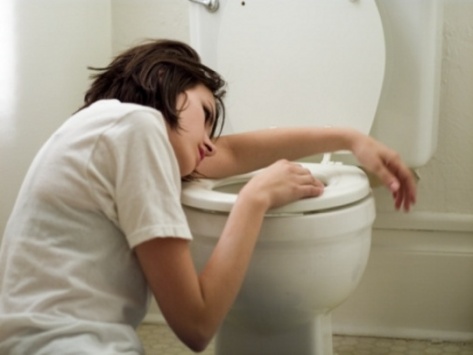 Do you have a stomachache, feel nauseated, and have you experienced intestinal flu symptoms that just won’t disappear? Sharp pain on your right side? Bloating, gas and general fatigue? You might have gallstones or gallbladder inflammation. Check out this article for more information about gallstones, gallbladder disease and what causes it.
Do you have a stomachache, feel nauseated, and have you experienced intestinal flu symptoms that just won’t disappear? Sharp pain on your right side? Bloating, gas and general fatigue? You might have gallstones or gallbladder inflammation. Check out this article for more information about gallstones, gallbladder disease and what causes it.
What is the Gallbladder?
The gallbladder is a small, small sac-shaped organ beneath the liver. The gallbladder functions as a storage place where bile is kept after secretion by the liver and before release into the intestines. When food enters the intestines your body sends signals to the gallbladder to contract and the bile mixes with the food. Bile is essential for digestion and absorption of fats (such as cheese, butter, and oil) and fat-soluble vitamins. It helps us digest fats in the small intestine. Many body waste products are also eliminated from the body by secretion into bile and pass out of the body through the feces or bowel movement.
 What Are Gallstones?
What Are Gallstones?
Gallstones are small, hard crystalline masses. They form abnormally in the gallbladder or bile ducts. Gallstones are created from bile pigments, cholesterol, and calcium salts. They can go undetected for many years or may cause severe pain and blockage of the bile duct. Gallstones can cause inflammation and thickening or abnormalities in the gallbladder wall. Of serious concern is the possibility of a gallstone blocking the bile duct. This is considered a medical emergency.

What is Gallbladder Disease?
Chronic inflammation of the gallbladder is regarded as gallbladder disease, which is known as cholecystitis. The most common cause of inflammation is gallstones. Chronic inflammation can result in periodic symptoms and pain that ranges from mild to severe, or can result in general adbominal flu-like symptoms that are experienced after each meal (particularly meals high in fat or greasy foods), or periodic episodes of sharp pains, nausea, and/or vomiting. Gallbladder disease can be misdiagnosed since symptoms are similar to lesser gastrointestinal problems such indigestion, or irritable bowel syndrome.

What are Symptoms of Gallstones or Gallbladder Disease?
Symptoms of gallstones or gallbladder disease can include the following:
- severe abdominal pain
- right shoulder pain
- back pain
- pain after eating
- cramps
- pain from breathing or shortness of breath
- chest pain (angina)
- heartburn
- indigestion
- gas and flatulence
- burping
- bloating
- vomiting
- nausea
- fever
- shaking with chills
- tenderness of right side of abdomen (to touch)
- jaundice (yellowing of the skin and eyes)
- feces often lighter color, like clay
 What is the Common Treatment?
What is the Common Treatment?
Gallbladder disease left untreated can result in a medical emergency. It is important to check with your trusted physician or health practitioner. The most common treatment is gallbladder surgery. You can live a comfortable life without a gallbladder. At one time the gallbladder was a necessary functioning part of the body, but the body can function without it. There are medications that can be taken to dissolve gallstones but this is usually temporary and they find that the gallstones commonly will reappear. Surgery can be done laparoscopically.
 Are There Natural Treatments?
Are There Natural Treatments?
The most effective natural treatment is a change in diet. Change in diet is not considered a substitute for surgery. After gallbladder surgery it is wise to eat non-greasy foots low in fat, and maintain a healthy lifestyle. People who have diabetes or are pregnant, have a higher risk of complications from gallbladder attacks and should use choleretic (bile-stimulating) herbs with caution. Milk thistle and dandelion root are safe for pregnant women. Always consult with your trusted health care provider before you change your diet, or take any new antioxidantsor supplements. The following diet may be helpful after gallbladder surgery or to reduce symptoms, and prevent aggravation to the gallbladder
- foods high in iron
- B vitamin foods
- whole grains
- dark leafy greens (spinach and kale)
- antioxidants
- squash
- bell pepper
- cherries
- tomatoes

- blueberries
- avoid white breads, white rice, pasta, sugar
- foods high in fiber
- tofu
- no tobacco
- no packed cookies, crackers, etc.
- no margarine
- avoid caffeine

- no alcohol
- beans
- cold-water fish
- flaxmeal
- healthy oils (olive oil, coconut oil)
- no transfats
- multivitamin
- vitamin C for immune support
- vitamin D for immune support
- decaffeinated green tea
- milk thistle
 Other Natural Treatments
Other Natural Treatments
It might be helpful to consider other forms of natural treatments of pain and indigestion, such as homeopathic remedies (such as colosynthis, cheliodonium, and lycopodium) to help with abdominal pain, light physical exercise 3-5 times a week, getting tested for food allergies, acupuncture to reduce spasms and control pain, and/or a heat pack to reduce swelling. None of these treatments are recommended to be substituted for the care of a trusted physician. Early treatment usually ends symptoms and recurrence, however symptoms can reappear.
References and Resources
Bonis PA, et al. Approach to the adult with chronic diarrhea in developed countries. http://www.uptodate.com/home.
Cabrera C, Artacho R, Gimenez R. Beneficial effects of green tea — a review. J Am Coll Nutr. 2006;25(2):79-99.
Fisher M, et al. Diarrhoea after laparoscopic cholecystectomy: Incidence and main determinants. ANZ Journal of Surgery. 2008;78:482.
Gaby AR. Nutritional approaches to prevention and treatment of gallstones. Altern Med Rev. 2009:14(3):258-67.
Gallbladder. Nutrition Care Manual. Academy of Nutrition and Dietetics. http://nutritioncaremanual.org/index.cfm.
Jeong SU, Lee SK. Obesity and gallbladder diseases. Korean J Gastroenterol. 2012;59(1):27-34.
Ko, CW. Prefac: Gallbladder disease. Gastroenterol Clin North Am. 2010;39(2):xiii.
Liu B, Beral V, Balkwill A. Childbearing, breastfeeding, other reproductive factors and the subsequent risk of hospitalization for gallbladder disease. Int J Epidemiol. 2009;38(1):312-8.
Liu B, Beral V, Balkwill A, et al. Gallbladder disease and use of transdermal versus oral hormone replacement therapy in postmenopausal women: a prospective cohort study. BMJ. 2008;337:a386.
Rai A, Tewari M, Mohapatra SC, et al. Correlation of nutritional parameters of gallbladder cancer patients. J Surg Oncol. 2006;93(8):705-8.
Shaffer EA. Gallstone disease: Epidemiology of gallbladder stone disease. Best Pract Res Clin Gastroenterol. 2006;20(6):981-96.
Tsai CJ, Leitzmann MF, Willett WC, et al. Long-Term Effect of Magnesium Consumption on the Risk of Symptomatic Gallstone Disease Among Men. Am J Gastroenterol. 2007; [Epub ahead of print].
Venneman NG, van Erpecum KJ. Gallstone disease: Primary and secondary prevention.Best Pract Res Clin Gastroenterol. 2006;20(6):1063-73.
Walcher T, Haenle MM, Mason RA, et al. The effect of alcohol, tobacco and caffeine consumption and vegetarian diet on gallstone prevalence. Eur J Gastroenterol Hepatol. 2010;22(11):1345-51.
Wang F. Oral contraceptives and risk of gallbladder disease. CMAJ. 2011:183(13):1517.
________________________________________
 This article is written by Jean Voice Dart, M.S. Special Education from Illinois State University. Jean is a published author and has written hundreds of health articles as well as hosting a local television program, “Making Miracles Happen.” She is a Registered Music Therapist, Sound Therapist, and Master Level Energetic Teacher, and is the Executive Director, founder and Health and Wellness Educator of the Monterey Bay Holistic Alliance. The Monterey Bay Holistic Alliance is a registered 501 (c) 3 nonprofit health and wellness education organization. For more information about the Monterey Bay Holistic Alliance contact us or visit our website at www.montereybayholistic.com.
This article is written by Jean Voice Dart, M.S. Special Education from Illinois State University. Jean is a published author and has written hundreds of health articles as well as hosting a local television program, “Making Miracles Happen.” She is a Registered Music Therapist, Sound Therapist, and Master Level Energetic Teacher, and is the Executive Director, founder and Health and Wellness Educator of the Monterey Bay Holistic Alliance. The Monterey Bay Holistic Alliance is a registered 501 (c) 3 nonprofit health and wellness education organization. For more information about the Monterey Bay Holistic Alliance contact us or visit our website at www.montereybayholistic.com.
Disclaimer: The Monterey Bay Holistic Alliance is a charitable, independent registered nonprofit 501(c)3 organization and does not endorse any particular products or practices. We exist as an educational organization dedicated to providing free access to health education resources, products and services. Claims and statements herein are for informational purposes only and have not been evaluated by the Food and Drug Administration. The statements about organizations, practitioners, methods of treatment, and products listed on this website are not meant to diagnose, treat, cure, or prevent any disease. This information is intended for educational purposes only. The MBHA strongly recommends that you seek out your trusted medical doctor or practitioner for diagnosis and treatment of any existing health condition.

